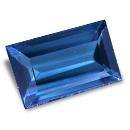|
ClassicGems.net |
|
|
 |
| Indicolite (variety of Tourmaline) |
|
|
First cited in 1801; IMA status: Not Valid - Rejected (variety name) | |||
|
|
|
More Information |
|
|
|
|
|
|
Indicolite
is a variety of Elbaite,
Tourmaline. |
|
Type Locality: |
Unknown |
|
Year Discovered: |
Unknown; first cited in 1800 |
|
View mineral photos: | |
|
|
|
|
Unusual Gem Categories |
|
|
|
|
|
| |
|
|
|
|
More Information |
|
|
|
|
|
| |
|
|
|
|
Indicolite is a blue variety of Tourmaline, that is usually, but not always, the Elbaite variety of Tourmaline. A true Indicolite color is a light to dark, saturated blue. Of course a true Indicolite will be a pure blue, but the name has come to be used for just about any shade of blue ranging from grayish blue to violet-blue. Indicolite was named in 1800 by Brazilian mineralogist José Bonifácio de Andrada e Silva (1763-1838). The name Indicolite is from the original indigolite, which is from the early 18th century French word indigo, meaning deep blue color, and the Greek word λίθος, (lithos) meaning stone. The French word indigo referred to a blue dye obtained from a plant of the genus Indigofera. Indigofera is a large genus of over 750 species of flowering plants belonging to the family Fabaceae, commonly known as the legume, pea or bean family, Indicolite is found in Afghanistan, Brazil, Madagascar, Mozambique, Namibia, Nigeria, Pakistan, Sri Lanka and the United States (California and Maine). Indicolite distribution: in Afghanistan at Paprok, Kamdesh District, Nuristan Province. At several localities in Minas Gerais, Brazil: at the Cruzeiro mine, São José da Safira and Santa Rosa mines, Doce valley and at Barra de Salinas district, Barra do Salinas, Coronel Murta, Jequitinhonha Valley. In Madagascar at the Anjahamiary pegmatite, Tranomaro Commune, Amboasary District, Anosy Region, Tuléar Province. In Namibia at the Otjua Mine, Otjua Farm 37, and at Karibib District, Erongo Region. In Pakistan at Stak Nala, Haramosh Mts., Skardu District, Baltistan, Gilgit-Baltistan. In the USA at several mines in the Warner Springs District, San Diego County, California; and several mines in the Mesa Grande District, Aguanga Mountain District and the Pala Districts of San Diego County, California; in Maine at Crooker Gem Pegmatite Quarries, Newry, Oxford County and at the Oak Hill Road Cuts, Standish, Cumberland County; in New Hampshire at the Chickering Mine, Walpose, Cheshire County. |
|
|
Indicolite gems for sale: We have not photographed our indicolite gems yet. Please check back soon. |